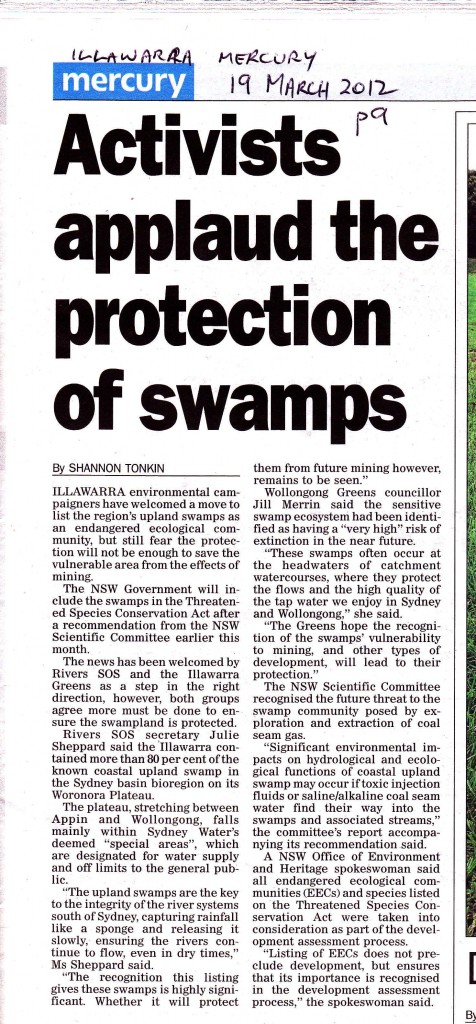There was standing room only at Cawdor Primary School near Camden as over 70 people including representatives from Rivers SOS’s member groups from around NSW gathered for sharing of information and for discussion with six MPs also in attendance, plus Wollondilly Councillors and Deputy Mayor.
Rivers SOS groups are concerned over the expansion of coal mining and CSG extraction, to the detriment of river systems, aquifers and prime agricultural land. We were happy to have this dialogue with senior politicians and decision-makers.
Groups represented were from the Hunter, Merriwa, Blue Mountains, Southern Highlands, Gloucester, Wedderburn, Georges River, Sutherland, Illawarra, Oakdale, Putty Valley, Stanwell Park, Sydney, Douglas Park, Helensburgh, Picton, Razorback,Thirlmere, Campbelltown, Robertson, Penrith and Wollondilly. Drew Hutton, Lock the Gate leader, and Keith Muir of the Colong Foundation were among prominent speakers.
Speaking on a panel of MPs from the three major parties were Chris Hartcher (Lib), NSW Minister for Resources and Energy; Luke Foley (ALP), Shadow Minister for Environment, Energy and Water; and Jeremy Buckingham (MLC), mining spokesman for the NSW Greens.
Other MPs in attendance were Chris Patterson, Liberal MLA for Camden; Russell Matheson, Federal Liberal member for Macarthur; Andrew McDonald, ALP Shadow Minister for Health, Labor MLA for Macquarie Fields, and Jai Rowell, Liberal MLA for Wollondilly. ALP guru and elder statesman Rodney Cavalier was also present.
Minister Hartcher outlined reforms made by his government to the mining approvals process, and was congratulated for removing the requirement for mining companies to buy exploration licences for fees running into hundreds of millions. However the government’s Strategic Regional Land Use and Aquifer Interference draft policies were criticised for failure to give promised protection to vital agricultural land and water resources. The government was also criticised for failure to give adequate support to alternative energy sources.
Luke Foley admitted that the ALP need to revise the lack of balance in the pro-mining policies it held while in government. Jeremy Buckingham outlined Greens policies, insisting on proper research being carried out before approvals are granted. The Greens had proposed a moratorium on expansion until this is done, a motion which was defeated in parliament.
After lunch, a panel of speakers concerned with coal mining and CSG extraction in Sydney’s drinking water catchment Special Areas included Cr. Larry Whipper, Deputy Mayor of Wingecarribee Council and member of the Sydney Catchment Authority Board; Dr Ann Young, expert on the upland swamps of the Woronora Plateau; and Dr Peter Turner, founder of the Save Our Water Catchment Areas campaign.
Group representatives signed a letter to Minister Katrina Hodgkinson, cc to the Premier and Minister Robyn Parker, protesting at the removal of environmental and community positions from the boards of the EPA and the SCA, and asking for a meeting with a Rivers SOS delegation about this and other matters.
Channel 2’s camera crew and local media were present, and a long segment on the event was included on the ABC’s national news that evening.
On Sunday morning a large group was shown over the Thirlmere Lakes, suspected to have been badly depleted through longwall mining nearby.
Rivers SOS will hold our 13th regional meeting in August, venue to be decided.
PHOTOS:
Speakers lineup: Chair, Julie Sheppard -Secretary Rivers SOS; Luke Foley, Chris Hartcher and Jeremy Buckingham (seated on far right: Larry Whipper , Deputy Mayor of Wingecarribee Council and member of SCA Board ,and Peter Martin of the Southern Highlands Coal Action Group)
Lunch break: Drew Hutton, spokesman for Lock the Gate Alliance, with Denis Wilson of Australian Water Campaigners. Dr Peter Turner of Save our Water Catchment Areas in background.
[flickr album=72157629984676559 num=10 size=Thumbnail]


